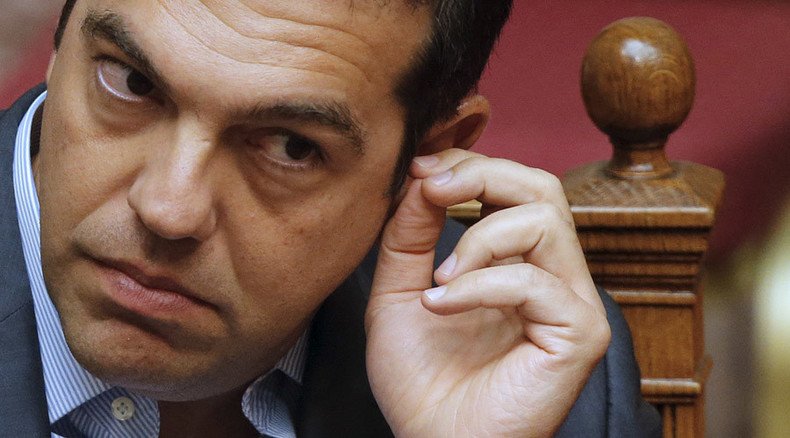Greek PM Tsipras steps down, calls early elections

Prime Minister Alexis Tsipras has confirmed his resignation and early election plans for Greece in a live address. The move comes after Athens managed to pay a huge chunk of its €3.4 billion debt to the ECB.
“The political mandate of the January 25 elections has exhausted its limits and now the Greek people have to have their say,” Tsipras said in a televised address Thursday night.
Tsipras said that he will now be looking for the Greek people to vote to continue the government program of his leftist Syriza party.
Local media have been speculating about the possible upcoming announcement since Thursday morning. Citing a source in the government, Reuters reported that Tsipras would propose holding the snap elections on September 20.
The resignation was handed in immediately after the address. However, no specific date for the snap poll was mentioned. However, Tsipras requested that President Prokopis Pavlopoulos hold the elections as soon as possible.
‘New Greek bailout doesn’t make sense economically’ http://t.co/hBVcUziqN9pic.twitter.com/trvNOlEMif
— RT (@RT_com) August 19, 2015Earlier in the day, Finance Minister Euclid Tsakalotos told ERT that this time the election “will not be the same as those of 2012, because now there is agreement, and there is a framework for the recapitalization of banks."
READ MORE: German parliament approves €86 billion Greek bailout
Energy Minister Panos Skourletis and other politicians have been recently calling for the government to return to the ballot box.
"The political landscape must clear up. We need to know whether the government has or does not have a majority," he told ERT.
BREAKING: Eurogroup agrees to launch third bailout program for Greece http://t.co/pz1nt9aqIWpic.twitter.com/BrleU5vpvB
— RT (@RT_com) August 14, 2015On Friday, eurozone finance ministers agreed to a third bailout program for the crisis-stricken country. Athens will receive a total of €86 billion over three years.
The same day, the Greek parliament approved a draft law enacting a third bailout plan. Forty-three members of Tsipras’s Syriza party, including former Finance Minister Yanis Varoufakis, voted against the bill or abstained. The party holds 149 seats in the parliament.
Big brother bailout: Troika to play hardball with #Greece – report http://t.co/vYcBmWH0Jbpic.twitter.com/kFUfRrOtiS
— RT (@RT_com) August 12, 2015Skourletis said that Greek PM should move faster: "I would say elections first, then the party congress."
According to a Syriza lawmaker in the European Parliament, Dimitris Papadimoulis, the elections "whenever they are announced by the government, will provide a stable governing solution.”
“My feeling is that Syriza will have an absolute majority," he told Mega TV.
Commenting on Tsipras’ decision to step down, Eurogroup President Jeroen Dijsselbloem stressed that it is “crucial that Greece maintains its commitments to the eurozone.”
“I recall the broad support in the Greek parliament for the new program and reform package and I hope the elections will lead to even more support in the new Greek parliament,” Dijsselbloem added.
‘Snap election – smart move by Tsipras’
Syriza party campaigner, Anastasia Giamali, said that announcing the vote was “a very smart move” by Tsipras considering the current situation in Greece and its political system.
“I think that the main reason Alexis Tsipras declared a snap election is to reduce the negative side effects for the people that voted for him and Syriza – the unemployed, the working classes, the poor, the pensioners,” she told RT.
Giamali defended the bailout deal Greece signed with the international creditors, stressing that it “isn’t the best agreement possible, but it’s a far better agreement that any previous government has brought up.”
According to the campaigner, Tsipras and Syriza “had no choice but to accept” the EU-IMF terms, as they negotiated “in an environment of banking and economic asphyxiation forced on the country.”
“And at the same time they promised, going into this election, to tackle tax evasion, corruption and bureaucracy – and this are problems that are… the causes of many problems in Greece and the crisis, to an extent,” she said.
Former Greek Diplomat and ambassador, Leonidas Chrysanthopoulos, told RT that people in Greece are starting to realize that they can’t both remain in the euro and avoid austerity.
“This is maybe one reason, why Tsipras is making the snap election so quickly… so that the people won’t be attacked by all the austerity measures that will come in basically in October,” he explained.
The foreign creditors “will be worried [because of the upcoming election], basically, because from now until … the elections will be held no measure that has been imposed upon Greece will be implemented because basically we will have a caretaker government that will not have the power to implement these measures,” Chrysanthopoulos said.
No matter what the outcome of the snap election will be, the European leaders who gave Tsipras a hard time during the debt negotiations have already achieved their goal, sociology professor Costas Panayotakis at the City University of New York told RT.
“European leaders got what they wanted, which was continuation of the austerity policies and from their point of view that sends a message to other anti-austerity forces in Europe, notably in Spain, that there is no alternative,” Panayotakis said. “What has happened in Greece, for the moment, is a bit of a setback for anti-austerity throughout the continent and that may affect the elections that will be coming up in many other parts of Europe.”













